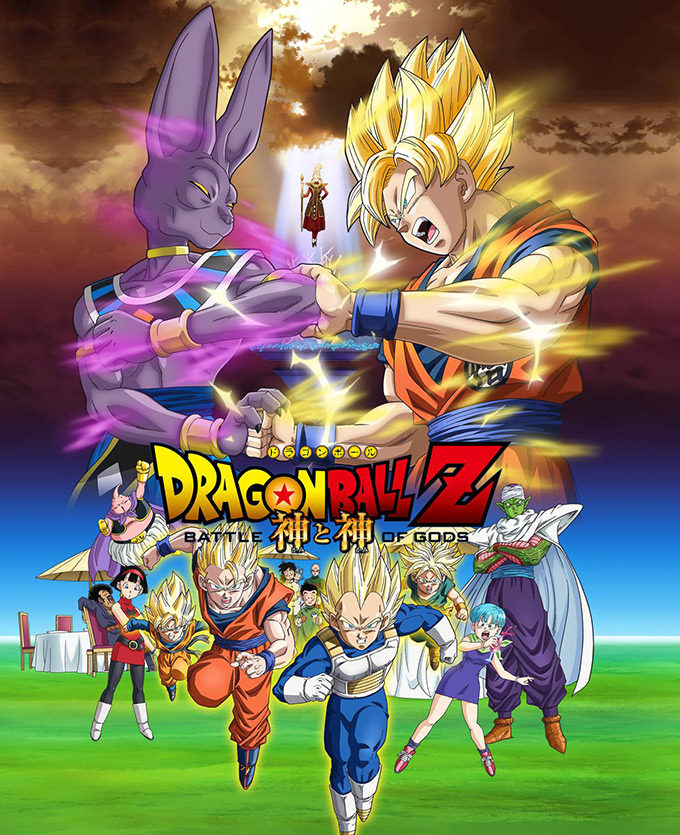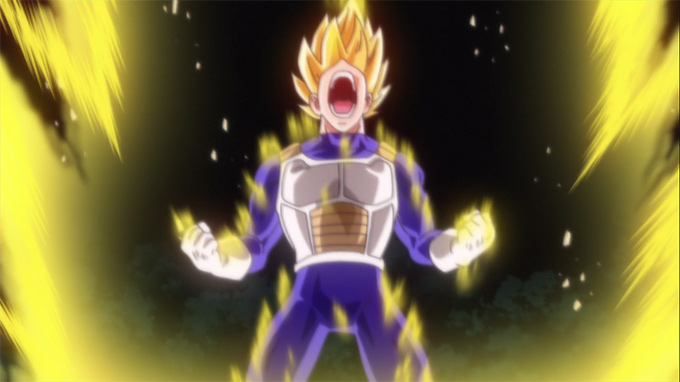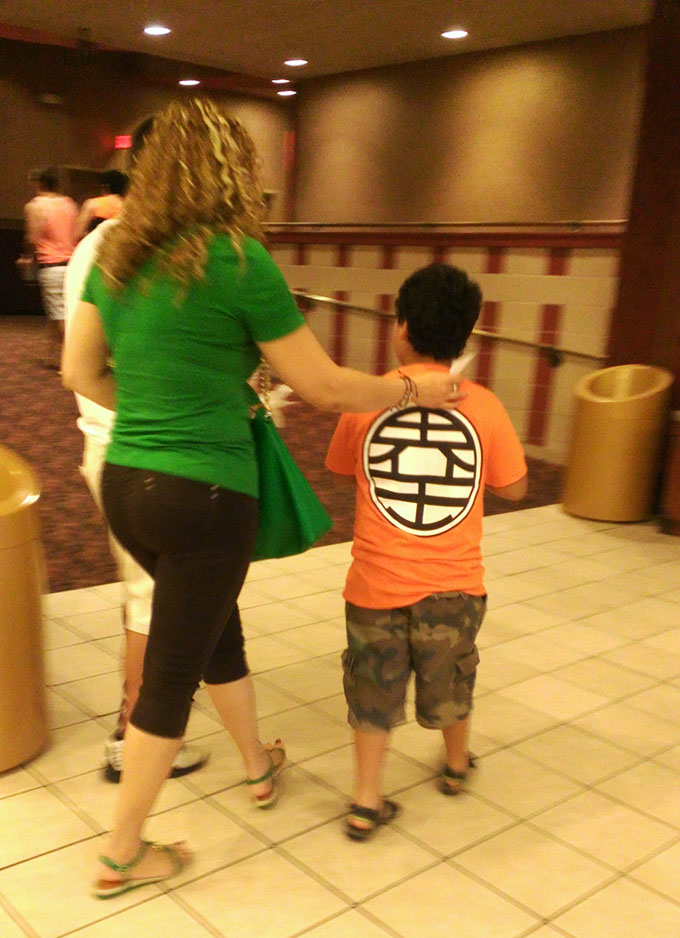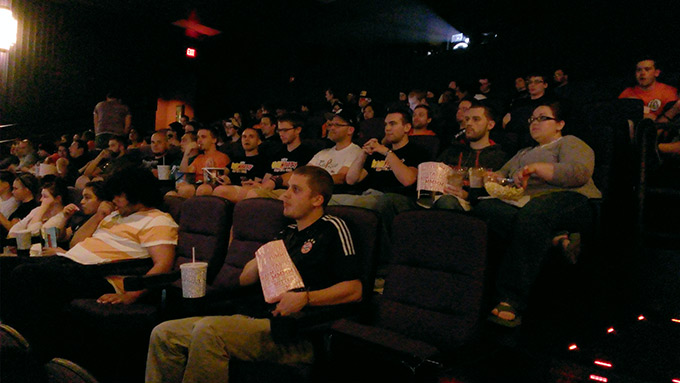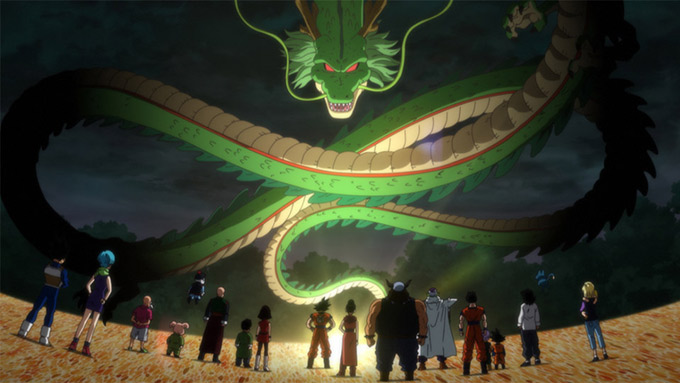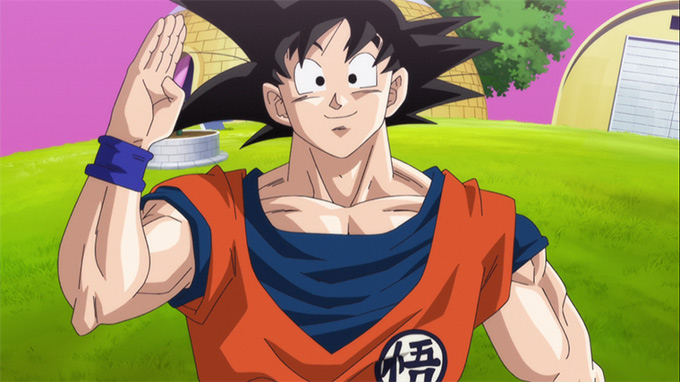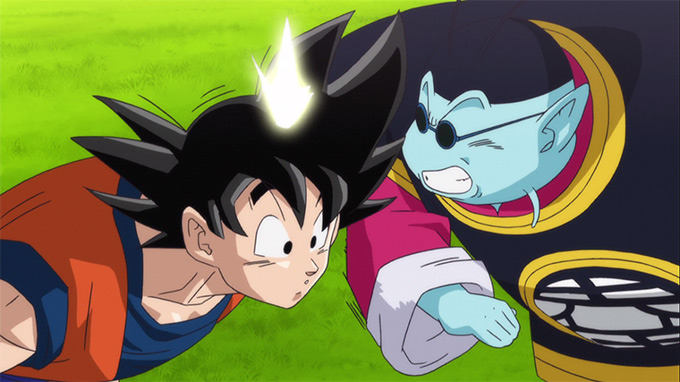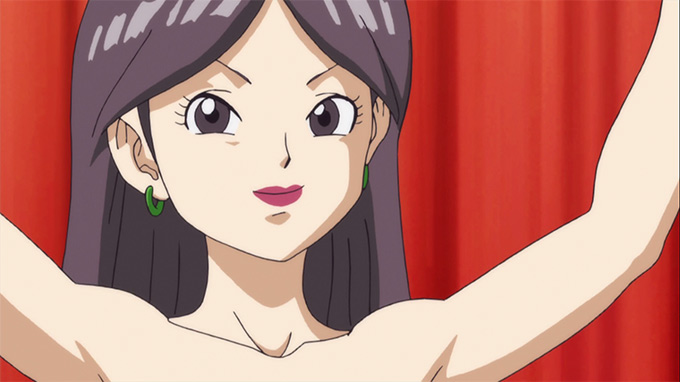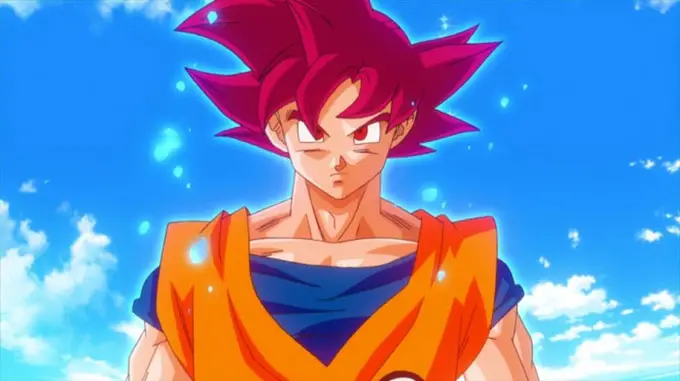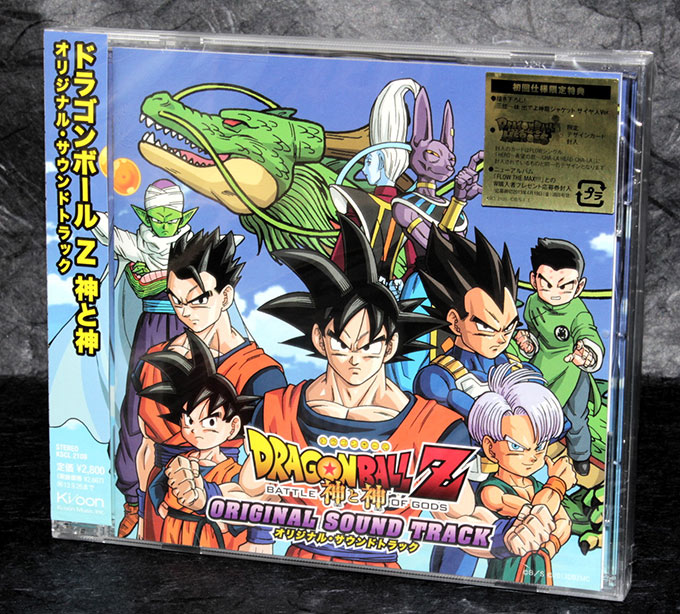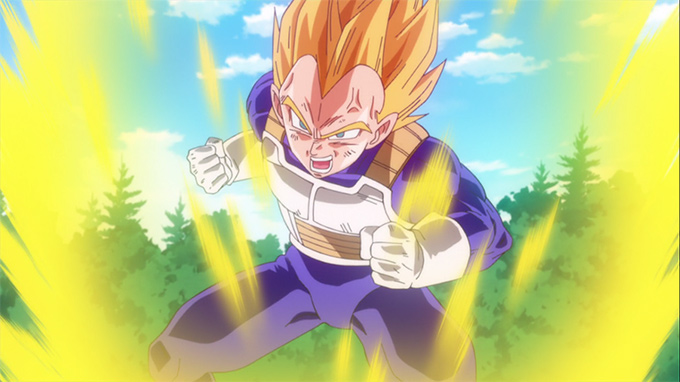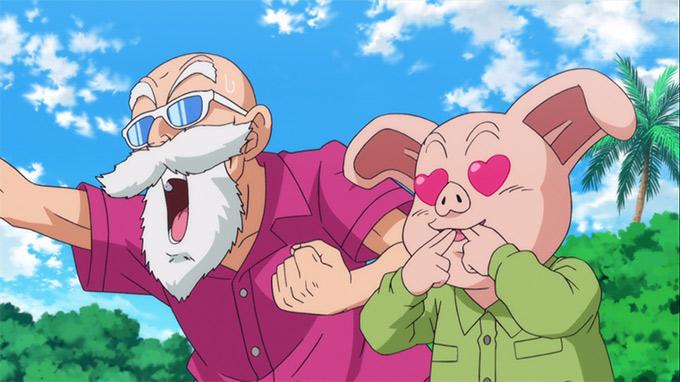Dragon Ball Z: Battle of Gods Theatrical Review
Dragon Ball Z: Battle of Gods is now in theaters across the United States and Canada.
So how does DBZ perform on the silver screen?
This is a review of Dragon Ball Z: Battle of Gods in a theater in the United States, and does not reflect the home experience.
It’s the first feature film in 17 years and it’s written by Akira Toriyama himself.
So it’s a big deal.
Let’s go, yo!
The Acting
This film is a showcase for the Dragon Ball Z voice actors.
Seán Schemmel as Gokū gives his best performance to date.
He’s funny and lighthearted, classic Goku.
Then while fighting his screams and grunt sound deep and intense, without being grating, and his kamehameha’s are the best they’ve ever been.
The fact he plays King Kai at the same time and in the same scenes is icing on the cake.
When I texted Seán after the premiere of the film on August 5, he wrote back to say:
“I consider it the highlight of my career.”
I agree.
Christopher Sabat likewise does a great job of playing Vegeta, Piccolo, Shenron, (and thousands of other characters).
Battle of Gods is as much about Vegeta’s character arc and growth as a man, as it is about Gokū becoming a Super Saiyan God.
Chris’s nervous portrayal of Vegeta trying to keep Lord Beerus calm so he doesn’t destroy the earth is serious yet comical. You get the feeling that Vegeta is swallowing his pride and doing everything he can to save the earth.
And then on the flip side you get to see him scream with rage and kick some ass.
So Vegeta displays a wider range of emotions than he ever has before, and Chris has grown alongside the character.
The newcomers to the cast of Jason Douglas as Beerus, and Ian Sinclair as his assistant Whis, do an excellent job. I feel like they are well cast for the role and their voices sound like natural extensions of the characters themselves.
There are a few characters I don’t like the sound of, such as Pilaf’s (by Chuck Huber), but that’s always been my opinion. And as far as acting goes, all of the cast do a great job and it’s clear they’re professionals.
One performance that particularly stands out is Monica Rial as the new voice of Bulma, replacing the ever-present Tiffany Volmer. Not because I prefer it, but because it’s different. If you’re a long time English dub fan, then you’ll notice the switch. I think Monica does as good a job of playing a drunk Bulma as anyone can.
In conclusion, even though I prefer the Japanese original of Dragon Ball Z, I have to give credit where it is due and admit that the English voice actors have improved tremendously over the years.
They’ve been playing these characters for 17 years without a break (including in the video games and in Dragon Ball Z Kai), so when it comes time for this performance in Battle of Gods, they bring their A Game.
I enjoyed the English film more than the original Japanese.
Since it’s in my native language the jokes are easier to understand, the punch lines come across wittier, and the interplay between the characters is a blast.
It’s just more fun. And that sense of levity adds to the overall feeling.
The Feeling
There’s something important to understand about Battle of Gods.
It’s a film written by Akira Toriyama, while all of the other Dragon Ball Z movies up to this point have been written by other people.
That means it’s not about in-your-face power ups and explosions.
It’s about the jokes, the characters playful banter, and their character development.
It’s more about personalities in conflict with one another than it is about colliding fists.
And it’s about giving another generation of fans a chance to fall in love with the series.
So if you’re going into the theater expecting it to be the typical “American DBZ” experience, filled with loud music, screaming, and non-stop noise, you’re going to be disappointed.
But if you understand that this is a showcase for Toriyama’s charm, then you’ll love it.
The film has a lighthearted and fun feeling, and even the main bad guy is undercut by his own weaknesses and jokey obsession with pudding.
In short, it makes you laugh and makes you feel good.
That’s a rare feeling to get when you’re in a theater, and is something lacking in today’s movies. There’s no sex, over the top violence, drug use, or profanity.
You’ll have a good time and walk out feeling better than when you walked in.
The Theatrical Experience
The theatrical experience of watching the movie adds so much more enjoyment to the movie compared to when watching it at home.
It’s like a being in a room with 600 other people just like you.
The theater I attended was packed with Dragon Ball Z fans and they all came to have a good time. A lot of them wore Dragon Ball Z T-shirts (including myself), while others dressed in cosplay.
And everyone was laughing out loud or fired their kamehameha’s alongside Gokū.
Toriyama uses situational comedy and brings everyone in the audience up to speed, so it’s not reliant on your previous knowledge. But if you do know the characters, then the jokes are even funnier.
Even my dad, who had never seen Dragon Ball Z before, enjoyed the movie and laughed along with everyone else.
At the end of the screening I was a little sad, because all of those fun times came to a conclusion and I knew that meeting so many other people who love DBZ as much as I do wasn’t going to happen again.
It’s a once in a lifetime feeling that no Dragon Ball Z fan should miss.
Story
The story holds up well.
It takes place during the canonical story of the Dragon Ball manga, between the defeat of Majin Buu and the meeting of his reincarnation of Uub. So this is part of the official series by Toriyama.
The movie is fairly well paced, but there are parts of the story that drag on, such as the bits with Pilaf and his accomplices. And the motorcycle cop scene in particular is completely unnecessary.
You may be a little disappointed that it doesn’t come right out of the gate with a huge fight and massive explosions. But again, that’s not what this movie is about.
Given the lengthy battles we experienced in Dragon Ball Z, such as with Freeza, I suppose the final fight could have been a little longer, but I don’t mind that it wasn’t. I think it ended right when it should have.
Along the way we get to see some new character developments for Gokū and Vegeta, and I think it’s playful and fun.
The ending is also noteworthy because it’s the complete opposite of what you expect, and it helps expand the DBZ universe even further.
All in all, it’s an enjoyable trip back to the Dragon World.
Translation and Adaptation
The translation and adaptation into English are surprisingly good.
Dragon Ball is a series that contains a lot of cultural references mixed in with the jokes and action. So having watched the Japanese version dozens of times, I was a little concerned they would be lost in the translation to English.
While there are some things that are changed or edited, I feel that FUNimation did a good job of bringing over the same feeling.
For example, when Gokū first introduces himself to Lord Beerus, in the Japanese he says his trademark, “Ossu! Ora Gokū!” This is a rough and masculine way of talking to someone and should never be used to speak to those who are in a higher position to you. So Kaiō bonks him on the head and Gokū has to do his best job of being polite.
Saying, “Hey, I’m Gokū!” doesn’t carry the same cultural connotations. But they make up for this afterward in Gokū’s stilted way of talking as he tries to put words together and form a polite sentence. Seán acts the part so well that it still carries a laugh out loud feeling of humor.
Similar situations occur throughout the rest of the film.
And there is also some censoring, such as changing liquor to juice, or odd slang, such as Gokū saying “Sweet!” or someone else saying, “Dude.”
They’re minor elements that don’t detract much from the film. Though diehard fans will notice them.
So while I prefer the original cultural references (because hey, the culture of Dragon Ball is my thing), I commend the way they handled it.
After all, everyone in the theater was laughing.
The Art
Watching Battle of Gods feels like you’re visiting the Dragon World again, complete with dinosaurs, science fiction gadgets, ki blasts, Super Saiyan transformations, and everything else you want to see.
It uses a combination of standard 2D animation with 3D.
Some fans complain about the 3D, but I think it works well. It’s used just enough to give a dynamic feeling to the fights and makes it feel like the battles occur in the real world.
For example, when Gokū and Beerus fly through West City, it feels like they’re in a city. The 3D is effective in creating this feeling, so why not use it?
The colors are bright, the lines are clean, and Toriyama’s designs are fresh.
There isn’t a single disagreeable aspect to the art.
Super Saiyan God
Tied in with the art, I may as well talk about the big transformation in this movie, since everyone on the Internet has already discussed it to death (yet missed the whole point).
Super Saiyan God is not what you expect it to be.
It’s basically Gokū with red hair, red eyes, and smaller muscles.
Yeah, that’s right. He’s not a giant hulking beast with super long golden hair or monkey fur like everyone expected.
Here’s another thing you have to understand about Toriyama.
He does this on purpose.
Whatever you’re expecting, he gives you the opposite.
Back when Toriyama was writing the manga and Gokū was fighting in the 21st Tenkaichi Budokai, all of his readers wanted Gokū to win. So he had Gokū lose.
During the Namek arc, all of his readers wanted Vegeta to be featured more often. So he killed him.
And in Battle of Gods when all of his fans wanted the God transformation to look like a golden haired version of Super Saiyan 4 with huge muscles, he gives you a smaller Gokū who looks just like regular Gokū.
Love it or hate it (I love it), that’s Toriyama’s mindset at work.
It also harkens back to traditional concepts of spiritual possession of a divine spirit in a man’s body.
When spirit possession occurs it doesn’t physically transform the person’s body, they just become the vessel for that being.
So the idea that a Super Saiyan God inhabits Gokū’s body and makes his body more lean and efficient, rather than big and bulky, is so counter-intuitive to mainstream logic that I can’t help but call it genius.
I applaud Toriyama for doing the opposite of whatever everyone expects.
This ‘less is more’ approach is a bold move.
The Soundtrack
The soundtrack to Dragon Ball Z: Battle of Gods is a combination of subtle and mysterious tracks for Lord Beerus and Whis, with energetic tracks for Bulma’s birthday party and the fight scenes.
There is also an adaptation of Cha-la Head Cha-la, and an insertion pop song called HERO played during the big fight.
Even though it only plays for a minute, HERO creates a feeling of intense excitement just like the DBZ from the days of our youth. But oddly, the Japanese singers in the band, FLOW, insisted on adapting the song into English, but their English is so poor that you can barely tell what they are saying. Though it’s still fun.
There isn’t a single track that I don’t like, but there are only a handful of tracks that stand out on their own as worth listening to outside of the movie.
So the music does the job of supporting the characters, environments, and voice actors in the film by providing an emotional backdrop.
And that’s what it’s supposed to do.
Power Level
So what does the Scouter say about Dragon Ball Z: Battle of God’s power level?
Acting: 5/5
Feeling: 5/5
Theatrical Experience: 5/5
Story: 4.5/5
Translation: 4.5/5
Art: 5/5
Soundtrack: 4/5
Overall: 4.5/5
Conclusion
Dragon Ball Z: Battle of Gods is a great film that is well adapted, beautifully animated, and supported by a stellar cast. It’s filled with jokes that will you have you laughing the entire time.
Depending on your perspective, it may not be everything you expect. And I do have to admit that there are some scenes that are kind of unnecessary, but this is trumped by the lighthearted feeling that the movie gives you afterward. This feeling is worth the price of admission.
If you want to experience your childhood again, now’s your chance.
It will only be in the theaters for a short while, so I recommend you go while you can. Check dragonballz.com for theaters in your area and get tickets now, because the screenings are selling out.
The opening night on Tuesday, August 5, made $1 million in ticket sales.
This is Dragon Ball Z’s chance to be taken seriously as a legitimate art form by film critics and others who may not have noticed it yet. So ticket sales matter.
It’s what we’ve all been waiting for, so what are you waiting for?
As a Dragon Ball Z fan, it will be the best movie going experience you have all year.
